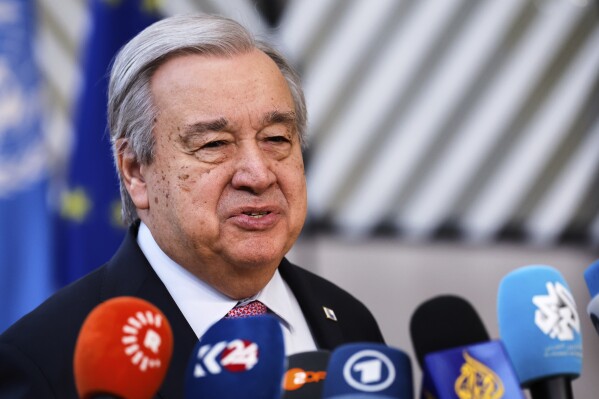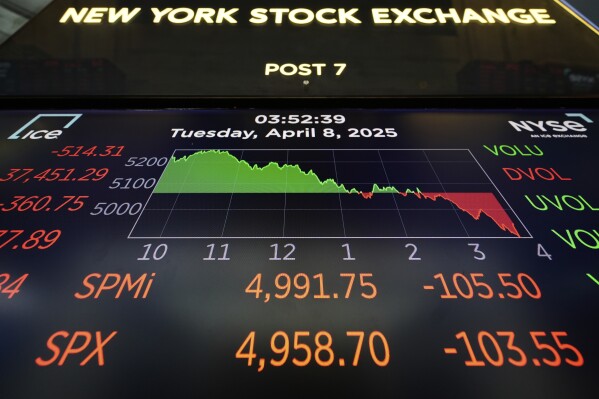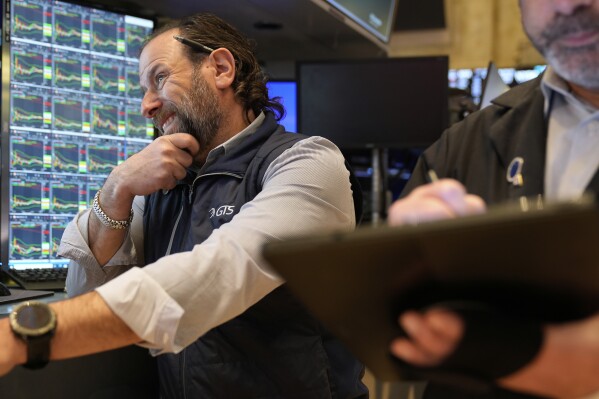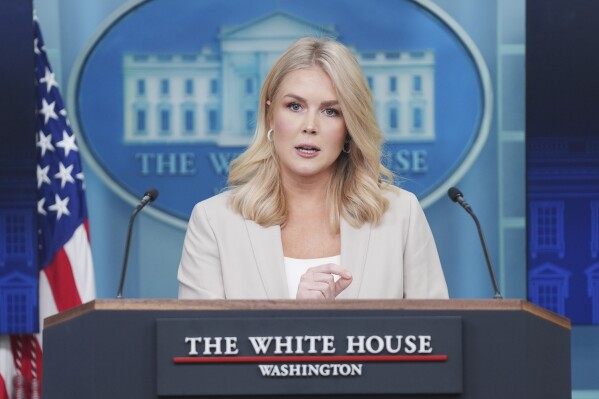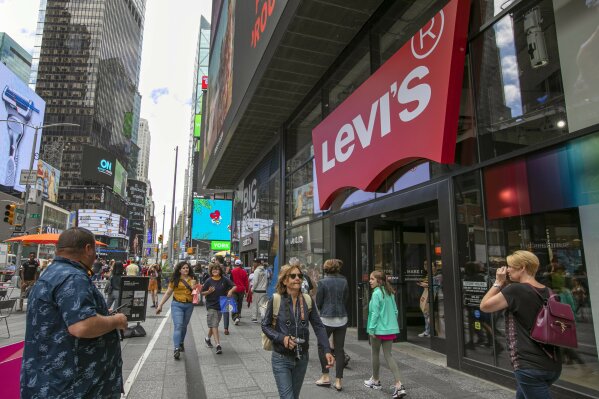Highlights from the US stock market: Stocks drop again as uncertainty reigns about Trump’s tariffs
Some relief is flowing through financial markets worldwide Tuesday as stocks recover a bit of their historic losses since President Donald Trump dramatically raised the stakes in his trade war last week
Today’s live coverage has ended. Read what you missed below and find more on the global markets at apnews.com.
U.S. stocks dropped after a second day of stunning reversals. The S&P 500 fell 1.6% Tuesday after wiping out an early gain of 4.1%, which had it on track for its best day in years. That brought the index nearly 19% below its record set in February.
The Dow Jones Industrial Average dropped 320 points after giving up an earlier surge of 1,460, while the Nasdaq composite lost 2.1%. Uncertainty is still high about what President Donald Trump will do with his trade war. The latest set of tariffs, including a massive 104% levy on Chinese imports, are scheduled to kick in after midnight.
What to know:
- Canada retaliates with 25% auto tariffs: Canada says it’s implementing retaliatory tariffs of its own just after midnight on Wednesday. The country will put a 25% tariff on auto imports from the United States that do not comply with the USMCA, the 2019 North American trade pact put into place during Trump’s first term.
- China threatens to retaliate against Trump’s new tariffs: China said it would “fight to the end” and take countermeasures against the United States to safeguard its own interests after Trump threatened an additional 50% tariff on Chinese imports.
- US trade rep says Trump tariffs are getting results: U.S. Trade Representative Jamieson Greer testified before the Senate Finance Committee that “about 50'’ countries have so far sought talks to escape Trump’s import tariffs. The import taxes are designed to reduce America’s massive trade deficits, but Greer conceded that the adjustment might ”be challenging at times.’'
Canada retaliates with 25% auto tariffs in response to Trump’s import taxes
In response to President Donald Trump’s tariffs, Canada says it’s implementing retaliatory tariffs of its own just after midnight on Wednesday.
Canada will put a 25% tariff on auto imports from the United States that do not comply with the USMCA, the 2019 North American trade pact put into place during Trump’s first term.
The Canadian government is also putting in a framework to bolster auto production and investment in its country as well as providing a special exception on tariff countermeasures for residents of Campobello Island, New Brunswick.
How major US stock indexes fared
On Tuesday:
- The S&P 500 fell 79.48 points, or 1.6%, to 4,982.77.
- The Dow Jones Industrial Average fell 320.01 points, or 0.8%, to 37,645.59.
- The Nasdaq composite fell 335.35 points, or 2.1%, to 15,267.91.
- The Russell 2000 index of smaller companies fell 49.43 points, or 2.7%, to 1,760.71.
For the week:
- The S&P 500 is down 91.31 points, or 1.8%.
- The Dow is down 669.27 points, or 1.7%.
- The Nasdaq is down 319.87 points, or 2.1%.
- The Russell 2000 is down 66.32 points, or 3.6%.
For the year:
- The S&P 500 is down 898.86 points, or 15.3%.
- The Dow is down 4,898.63 points, or 11.5%.
- The Nasdaq is down 4,042.88 points, or 20.9%.
- The Russell 2000 is down 469.45 points, or 21.1%.
Energy prices fall
Energy commodities gave up early gains to finish lower. U.S. crude fell 1.8% to $59.58 a barrel. Natural gas dropped 5.2%.
Shares of most oil and gas companies closed with losses. Occidental Petroleum dropped 6.8%, ConocoPhillips fell 3.5% and Exxon slipped 2.2%.
UN Secretary-General Antonio Guterres says in a trade war ‘everybody tends to lose’
He told reporters Tuesday that he’s particularly worried about the effect of U.S. tariffs and the trade war it’s unleashing on “the most vulnerable developing countries in which the impact will be more devastating.”
Is the United Nations secretary-general worried a trade war will lead to a global recession?
“I sincerely hope that we will have no recession because a recession will have dramatic consequences, especially for the poorest people in the world,” Guterres said.
‘Magnificent Seven’ rack up more losses
The dominant group of U.S. stocks known as the “Magnificent Seven” racked up more losses Monday after a broad Wall Street rally gave way to another market rout.
Shares in Tesla and Apple fell the most, declining 4.9% and 5%, respectively.
Microsoft, Nvidia, Amazon, Meta Platforms and Google parent Alphabet all closed between 0.7% and 2.6% lower.
The “Magnificent Seven” are so massive in size, their movements carry more weight on the S&P 500 and other indexes than other stocks.
Since the major market sell-off last Wednesday, the “Magnificent Seven” have shed a combined market value of $2.12 trillion.
China charges that Trump’s sweeping tariffs violate World Trade Organization rules
Beijing on Tuesday requested consultations with the United States over the 34% “reciprocal’’ tariff Trump imposed on Chinese imports.
The request is the first step the World Trade Organization’s dispute resolution process. If the issue is not resolved in 60 days, China can request that a WTO panel hear its case.
The Geneva-based organization was set up to enforce the rules of global trade.
It’s unlikely the Chinese complaint will amount to much. The United States in 2019 blocked the appointment of judges to the WTO Appellate Body, its supreme court. So cases that get appealed end up in limbo with no one to decide them.
US stocks drop after another stunning day of reversals
U.S. stocks dropped after a second day of stunning reversals. The S&P 500 fell 1.6% Tuesday after wiping out an early gain of 4.1%, which had it on track for its best day in years. That brought the index nearly 19% below its record set in February.
The Dow Jones Industrial Average dropped 320 points after giving up an earlier surge of 1,460, while the Nasdaq composite lost 2.1%.
Uncertainty is still high about what President Donald Trump will do with his trade war. The latest set of tariffs, including a massive 104% levy on Chinese imports, are scheduled to kick in after midnight.
JUST IN: S&P 500 drops 1.6% after another day of sharp reversals as uncertainty reigns over Trump’s trade war
Bitcoin moves lower
The price of bitcoin, the most popular cryptocurrency, fell to around $76,600 as it gave up an earlier gain, similar to stocks.
Also, the Justice Department announced it is disbanding a team of prosecutors who targeted cryptocurrency crimes and is shifting its focus away from complex crypto-related cases involving banking and securities law, according to a memo reviewed by The Associated Press.
Reader question: What’s Trump’s intention with these tariffs?
It is often unclear what the president’s endgame is, which adds to the uncertainty surrounding his trade wars. He has given different reasons for his sweeping import taxes, and sometimes they contradict each other.
Trump has said that tariffs can raise money for the U.S. Treasury, protect U.S. industries, draw factories to the United States and serve as a negotiating tactic to get other countries to bend to his will, whether it means getting them to reduce their own tariffs or to crack down on the illegal flow of drugs and immigrants into the United States.
However, if tariffs mean Americans buy fewer imports or if companies relocate factories to the United States, then revenue from tariffs will fall, undercutting his plan to use them as a money-generating alternative to the income tax.
Survey shows more negative views from Americans towards increased tariffs on China
Increased tariffs on China received more negative than positive evaluations from Americans, according to a recent Pew Research Center survey of views on Trump’s early foreign policy actions.
The survey was conducted before Trump’s April 2 announcement of the 34% reciprocal tariff on Chinese goods but after he had levied tariffs totaling 20% on Chinese goods over Beijing’s alleged failure to stem the flow of fentanyl precursors.
About half of U.S. adults said increased tariffs on China will be bad for the U.S. and a similar share think the tariffs will be bad for them personally, the poll found.
While Democrats overwhelmingly said the tariffs would be bad for the U.S. as well as for them personally, more Republicans said they would be good for the U.S. But when it came to tariffs’ impact to them personally, Republicans are more likely to say the impact will be bad, although about half express uncertainty or say the impact will be limited.
North Carolina senator presses Trump’s top trade negotiator, demands who should be held responsible if Americans suffer from trade war
President Donald Trump’s top trade negotiator came under fire Tuesday from senators unnerved by the president’s sweeping global tariffs, a market meltdown and the heightened risk of recession from an upended global trading order.
Sen. Thom Tillis, R-N.C., questions Eric Scott Turner, President-elect Donald Trump’s nominee to be Secretary of Housing, at a Senate Committee on Banking, Housing, and Urban Affairs hearing for his pending confirmation on Capitol Hill, Thursday, Jan. 16, 2025, in Washington. (AP Photo/Rod Lamkey, Jr.)
“It seems like we’ve decided to begin a trade war on all fronts,″ said Republican Sen. Thom Tillis of North Carolina. He said he wanted to know who in the Trump administration he should hold responsible — and “choke″ — if the tariffs fail and Americans suffer from higher prices and slower economic growth.
“I wish you well,″ he told U.S. Trade Representative Jamieson Greer. ”But I am skeptical.’’
Greer addressed the Senate Finance Committee a day after global markets swung wildly and some business leaders lambasted the president’s aggressive bid to raise tariffs on almost every nation on earth.
Italy’s PM to meet with Trump for tariff negotiations
Italy’s Prime Minister Giorgia Meloni told representatives of business associations on Tuesday that she will propose “a zero for zero” approach to tariffs when she meets with President Trump in Washington on April 17.
Meloni added that EU Commission President Ursula von der Leyen backed that approach, which includes the possibility of eliminating reciprocal duties on existing industrial products with the zero-for-zero formula, according to a source attending Tuesday’s meeting with Italian business representatives. They spoke on condition of anonymity because it was a closed door meeting.
White House now suggesting that high tariffs are bargaining chips
The White House now says that Trump’s tariffs are bargaining chips to reach better international trade deals – suggesting they aren’t permanent fixtures to reshape the global economy.
“Bring us your best offers and he will listen,” White House press secretary Karoline Leavitt said of other countries potentially negotiating tariffs rates with Trump.
She said Israeli Prime Minister Benjamin Netanyahu coming to Washington to talk trade “should serve as a model.”
Leavitt said China was “making a mistake” by responding with its own steep tariffs.
She insisted that negotiating, rather than steadfastly sticking to high tariffs, wasn’t an evolution amid stock market turmoil.
British PM says the UK is not yet ready to retaliate against US tariffs
British Prime Minister Keir Starmer said Tuesday that the U.K. needs to keep its options open regarding the U.S. tariffs.
“My instinct is that we shouldn’t jump in with both feet to retaliate,” Starmer told members of a Parliament committee. “Obviously we have to keep our options on the table and do the preparatory work for retaliation if necessary.”
Starmer said the tariffs are not a “temporary passing phase” but part of a “changing world order” and he wants to mitigate the import taxes through negotiation.
The U.K. is seeking a deal with the White House that would ease a 10% tariff on U.S. imports of British goods and a 25% tariff on cars.
European markets rally
Stock markets throughout Europe notched broad gains amid hopes that the potential for negotiations still exists over economically damaging tariffs.
Germany’s DAX closed 2.5% after shedding 4.1% on Monday. France’s CAC 40 rose 2.5% after shedding 4.8% on Monday. Britain’s FTSE 100 rose 2.7% after falling 4.4% on Monday.
European markets have been following the same volatile twists and turns as U.S. and Asian markets. They will likely remain volatile amid the uncertainty over how and where the U.S. imposes tariffs, how other nations retaliate and how much damage the global economy sustains.
Banks kick off earnings season
Major U.S. banks will report their latest earnings Friday, but with a trade war stoking recession fears, investors and economists will likely focus more on their forecasts than first-quarter results.
President Donald Trump’s latest round of tariffs don’t necessarily directly impact banks, although the potential downstream effects — namely inflation and slower economic growth — could throw a wrench into their projections this year and beyond.
What’s more, analysts at JPMorgan point out that weaker global markets would lead to a decline in investment banking and wealth management fees, offset somewhat by higher trading revenue.
JPMorgan and Wells Fargo are among the big banks reporting Friday. Their shares dropped sharply at the end of last week but have recovered some losses the past two days.
‘Magnificent Seven’ bounce back
The dominant group of U.S. stocks known as the “Magnificent Seven” is bouncing back, helping power the broad rally on Wall Street.
Chipmaker Nvidia and Tesla are leading the pack in midday trading with a gain of 5.5% and 5.4%, respectively. Microsoft, Apple, Amazon, Meta Platforms and Google parent Alphabet are all up between 3% and 2.1%.
The solid rebound comes a day after the a mixed finish for the group.
The “Magnificent Seven” are so massive in size, their movements carry more weight on the S&P 500 and other indexes than other stocks.
Health insurers jump on expected Medicare Advantage payment increase
Shares of major health insurers got a boost Tuesday after the federal government announced a better-than-expected 2026 payment increase for Medicare Advantage plans.
The Centers for Medicare and Medicaid Services said Monday after markets closed that final rates are expected to increase more than 5% in 2026.
The rate increase is expected to cost taxpayers an additional $25 billion next year, CMS said.
Medicare Advantage plans are privately-run versions of the government-funded Medicare program mostly for people who are 65 and older.
Shares of the two largest Medicare Advantage plan providers, UnitedHealth Group Inc. and Humana Inc., climbed about 7% and 10%, respectively, Tuesday morning. Elevance Health Inc. and Centene Corp. rose nearly 4% each.
The health sector was among the biggest gainers in a broader market turnaround Tuesday.
Chipmakers power broader market’s gains
Nvidia surged 5.3%, Broadcom jumped 7.6% and Advanced Micro Devices rose 3.5%. The companies and broader technology sector jumped amid hopes for negotiations over tariffs.
Chipmakers and other technology companies have an outsized impact on the broader market because of their pricey valuations. Big moves for the sector’s most valuable companies can swing the market on their own or accentuate an already sharp move.
Technology companies have seen their values skyrocket over hopes for artificial intelligence advancements. Higher costs for chips and other technologies pose a risk to that development and the earnings growth prospects for those companies.
US sees fewer visitors from overseas
Visits to the U.S. from overseas fell 11.6% in March compared to the same month last year, according to preliminary government data.
Tourism industry experts suspect foreign travelers have been angered by President Donald Trumps’ tariffs and rhetoric, and alarmed by reports of tourists getting arrested at the border.
The CEO of research institute that studies the preferences of Chinese tourists says leisure trips to places like Disneyland, Hawaii and New York are decreasing dramatically. He calls the trend the “Trump Slump.”
The Travel and Tourism Office data released Tuesday didn’t include arrivals from Canada or land crossings from Mexico. Industry analysts are expecting U.S. visits by Canadians to drop significantly.
Reader question: How soon will prices rise as a result of tariffs?
It depends on how businesses both in the United States and overseas respond, but consumers could see overall prices rising within a month or two of tariffs being imposed. For some products, such as produce from Mexico, prices could rise much more quickly after the tariffs take effect.
Some U.S. retailers and other importers may eat part of the cost of the tariff, and overseas exporters may reduce their prices to offset the extra duties. But for many businesses, the tariffs Trump announced Wednesday — such as 20% on imports from Europe — will be too large to swallow on their own.
Companies may also use the tariffs as an excuse to raise prices. When Trump slapped duties on washing machines in 2018, studies later showed that retailers raised prices on both washers and dryers, even though there were no new duties on dryers.
A key question in the coming months is whether something similar will happen again. Economists worry that consumers, having just lived through the biggest inflationary spike in four decades, are more accustomed to rising prices than they were before the pandemic.
Yet there are also signs that Americans, put off by the rise in the cost of living, are less willing to accept price increases and will simply cut back on their purchases. That could discourage businesses from raising prices by much.
Thailand to send delegation to Washington for tariff negotiations
Prime Minister Paetongtarn Shinawatra said Tuesday that Thailand intends to send a high-ranking delegation to Washington to negotiate with their U.S. counterparts over the new tariff policies.
Thailand is facing a 36% tariff under the new U.S. rules.
The decision to have a delegation led by Deputy Prime Minister and Finance Minister Pichai Chunhavajira was made after Paetongtarn held a meeting with her ministers of finance, foreign affairs an commerce, along with the Thai Trade Representative.
The Bangkok Post newspaper cited Pichai saying Thailand’s plans include revising its import duties and amending non-trade barriers.
Paetongtarn said the government had anticipated the issue and earlier this year established a U.S. Trade Policy Working Group to study developments and formulate a comprehensive response strategy. She said her government plans to roll out immediate relief for affected sectors, particularly small businesses and workers, while simultaneously crafting a broader economic overhaul to diversify export markets and boost national competitiveness.
Treasurys yields on the rise
Treasury yields are rising again in a potential signal that investors are gaining more confidence in the U.S. economy’s path ahead.
The gains could also signal that investors expect more inflation ahead. Treasurys, which are often viewed as less risky investments than stocks, have been volatile amid worries about tariffs and the economy.
The yield on the 10-year Treasury rose to 4.24%, up from 4.17% late Monday and from 4.01% on Friday. Banks use the yield on the 10-year Treasury as a guide to pricing home loans.
The 10-year Treasury is often considered a proxy for the direction of mortgage rates.
The yield on the 2-year Treasury rose to 3.83% from 3.76% late Monday and from 3.64% late Friday. It often follows traders’ expectations for the Federal Reserve’s moves with short-term rates.
EU and Chinese leaders talk on trade and bilateral relations
Chinese Premier Li Qiang on Tuesday spoke on the phone with EU Commission President Ursula von der Leyen saying China and Europe should boost communications, expand opening-up markets to each other and jointly defend free and open trade and investment.
Li defended China’s retaliatory measures to Trump’s tariffs as not only safeguarding China’s interests but also fighting for global trading rules. He said China and the EU can help provide “more stability and predictability” for each other and for the world, according to China’s official news agency Xinhua.
In the call, von der Leyen “underscored the vital importance of stability and predictability for the global economy,” according to the official readout on the phone call. She also stressed the responsibility of Europe and China, as two of the world’s largest markets, to support a strong reformed trading system, which should be “free, fair and founded on a level playing field.”
Global markets bounce back
The bounce back for global markets on Tuesday perhaps shouldn’t be a surprise. Stocks don’t go in one direction forever, and some of the best days in the market’s history have been clustered around some of its worst days.
The biggest gain for the S&P 500 since World War II was an 11.6% surge on Oct. 13, 2008, for example. That was during the depths of the Great Recession, when worries were high that the financial system was collapsing and the S&P 500 was in the midst of a nearly 57% plunge from its peak in late 2007 until its bottom in March 2009. A couple weeks later, the index had another one of its best days in history, soaring 10.8%.
That’s one of the reasons many financial advisers suggest not trying to time the market and selling stocks and other investments meant for the long term when nervous, because of the risk of missing out on such huge up days.
Small business optimism slips in March
Small business owners’ optimism slipped in March, as they dealt with looming tariffs and other new policies implemented by the Trump administration.
Optimism fell 3.3 points in March to 97.4, according to a poll by The National Federation of Independent Business, which is a widely used gauge of the economic health of small businesses.
The index fell slightly below the 51-year average of 98, following four months above the average.
“The implementation of new policy priorities has heightened the level of uncertainty among small business owners over the past few months.” said NFIB Chief Economist Bill Dunkelberg. “Small business owners have scaled back expectations on sales growth as they better understand how these rearrangements might impact them.”
The gold bounce
After hitting a new high last week, gold prices have tumbled following Trump’s “Liberation Day.” But futures bounced back some Tuesday morning.
The price of New York spot gold hit all-time record on April 2, per FactSet, closing at about $3,134 per Troy ounce — the standard for measuring precious metals — just before Trump unveiled his self-described “reciprocal” tariffs. Prices fell in the days following, closing at nearly $2,982 Monday.
A rebound could be ahead. Futures jumped up to over $3,032 Tuesday morning.
Interest in buying gold typically spikes in times of uncertainty, as anxious investors seek a “safe haven” for parking their money. Many of Trump’s previously-imposed tariffs have helped fuel gold’s gains in recent months, even amid stock market turmoil. But precious metals are also volatile assets, so the future is never promised.
Levi Strauss says any price hikes will be ‘surgical’
Levi Strauss executives said on a conference call with investors late Monday said that any price increases it undertakes related to tariffs would be “surgical,” instead of broad-based.
Shares of Levi Strauss rose 9% in early trading after the jeans maker posted better first-quarter profit than Wall Street forecast and said it expected “minimal” impact from tariffs in the second quarter.
“Most of the product for spring, early summer is already in the U.S.,” said chief financial officer Harmit Singh.
Just how much President Donald Trump’s widespread tariffs would affect pricing has been a major concern for investors and analysts because tariffs generally act as a tax that gets passed on to consumers.
Levi earned 38 cents-per-share in the first quarter, easily topping the 28 cents-per-share that analysts forecast.
JUST IN: S&P 500 opens 3.4% higher as some relief washes through financial markets worldwide.
Will the tariffs lead to a recession? Here’s how to know if we’re in one
Economists at Goldman Sachs have raised their assessment of the odds the U.S. will experience a recession — where the economy shrinks and unemployment rises — to 45%, from 35%. Other economists are raising similar alarms, with JPMorgan putting the odds of a recession at 60% and projecting inflation will reach 4.4% by the end of this year, up from 2.8% currently.
Here’s a few things to know about recessions and how they work:
Are there any signs a recession is imminent?
Not yet. But one development that has sparked widespread fear is a real-time economy tracker maintained by the Federal Reserve’s Atlanta branch. As of Monday, it was indicating that the economy could shrink by 0.8% at an annual rate in the first three months of this year, down from 2.4% in last year’s final quarter.
What signals would suggest that a recession has begun?
The clearest signal would be a steady rise in job losses and a surge in unemployment. The government’s weekly report on the number of people seeking unemployment benefits, which is released every Thursday, is being closely watched for signs of rising layoffs. So far, applications for aid remain quite low by historical standards.
What are Trump and his officials saying?
President Donald Trump doubled down on his global tariffs Thursday, likening the U.S. economy to a ‘very sick’ patient who came out of an operation. “It’s gonna be a booming country, very booming country. It’s going to be amazing, actually,” Trump said to reporters aboard Air Force One on his way down to one of his Florida golf clubs.
On Sunday, Trump told reporters that “sometimes you have to take medicine to fix something.” Yet Treasury Secretary Scott Bessent on the same day said “there doesn’t have to be a recession” and that the administration is focused on “building the long-term economic fundamentals for prosperity.”
▶ Read more about how to watch for a recession
Ask AP your questions about tariffs
Have a question about how tariffs work? Ask below. We’ll answer a few in live coverage today and across apnews.com.
Tesla’s decline far outpaces S&P 500 average
Tesla stock market value has lost nearly $400 billion since the S&P 500 hit a peak on Feb. 19, a stunning 35% plunge. The index, by contrast, has fallen 17%.
Investors pushed Tesla stock to a record high after Donald Trump was elected on hopes Musk’s close ties would help the company. Instead, car buyers angry at Musk’s support for Trump and other right-wing politicians have boycotted his company.
A sharp decline Monday put Tesla’s stock at $233.29 and below its price on March 19, a key date. That is when Commerce Secretary Howard Lutnick made a surprising endorsement, urging Fox TV viewers to buy the stock in violation of a federal law banning government officials from endorsing companies.
Shares recovered somewhat in premarket trading Tuesday.
U.S. stocks gain in premarket trading
Futures for the S&P 500 gained 1.7% before the bell, while futures for the Dow Jones Industrial Average jumped 2.1%. Nasdaq futures climbed 1.5%.
Among the early gainers in premarket trading are Humana, up 14%, CVS, up 9.5%, and Norwegian Cruise Line Holdings, up 6.8%.
A round-up of global tariff reaction
If you’re just getting read in for the day, here’s a look at what happened overnight:
- Indonesia’s President Prabowo Subianto met investors, market players and economists in Jakarta, vowing to build the country’s economy with the goal of standing on “our own feet” following an American decision to impose a 32% import tariff on the country’s goods.
- The Pakistan Stock Exchange recovered 1.5% on Tuesday after going down 3.3% overall the previous day. The improvement came after authorities said the U.S. Secretary of State Marco Rubio had spoken with Pakistan’s deputy premier Ishaq Dar about economic cooperation.
- European Commission President Ursula von der Leyen held a call with Chinese Premier Li Qiang, urging China to avoid escalating a tariff war with the United States and to help ensure that Chinese products don’t flood other markets due to the fallout.
- Indian Foreign Minister S. Jaishankar spoke with his U.S. counterpart, Rubio, to push for an early conclusion of negotiations over a bilateral trade deal.
- In a speech, Malaysian Prime Minister Anwar Ibrahim said his government and others in Southeast Asia will send a delegation to Washington to discuss the tariff situation.
- New Zealand Prime Minister Christopher Luxon criticzed the U.S. tariffs in remarks to reporters, decrying what he says is a “shift away from agreed rules” of trade and warning of the risk of “backsliding into a global trade war.”
- Japanese Prime Minister Shigeru Ishiba met with his Cabinet to discuss how to respond to the U.S. tariffs, after he spoke by phone late Monday with Trump. Ishiba appointed Ryosei Akazawa, the economy revitalization minister, as Japan’s trade negotiator with the U.S..
- Sri Lanka says it has initiated trade talks with the U.S. to ease the new tariff hikes that could burden its already fragile economy.
- Australia’s prime minister and opposition leader have argued over who would best deal with President Trump in the first debate ahead of federal elections on May 3.
China isn’t out of options to retaliate for fresh tariffs
China still has a range of options to strike back at the Washington, experts say, including suspending cooperation on combating fentanyl, placing higher quotas on agricultural products and going after the U.S. trade in services in China such as finance and law firms.
U.S. total goods trade with China was an estimated $582 billion in 2024, making it the top trader in goods with the U.S. The 2024 deficit with China in goods and services trade was between $263 billion and $295 billion.
In Hong Kong, where stocks were slightly higher Tuesday, Chief Executive John Lee said the city would link its economy closer to China’s development, sign more free trade agreements, attract more foreign companies and capital to Hong Kong, and support local enterprises in coping with the impact of the tariffs.
Hong Kong Chief Executive John Lee pledged to strengthen strategies to address the U.S. tariffs in a weekly press briefing on Tuesday. (AP video by Alice Fung)
U.S. futures are up
World shares advance
World shares and U.S. futures advanced Tuesday, led by gains in Tokyo where the Nikkei 225 shot up just over 6% as markets calmed somewhat after the shocks from Trump’s tariff hikes.
The modest rebound for most markets followed a wild day on Wall Street, where stocks careened after Trump threatened to crank his double-digit tariffs higher.
Germany’s DAX gained 0.9% to 19,975.81 while the CAC 40 in Paris was up 1.3% at 7,018.79. Britain’s FTSE 100 also picked up 1.3%, to 7,804.73.
Hong Kong also recovered some lost ground, but nothing close to the 13.2% dive Monday that gave the Hang Seng its worst day since 1997, during the Asian financial crisis.
The Hang Seng gained 1% to 20,036.03. The Shanghai Composite index jumped 1.4% to 3,140.15 after the government investment fund Central Huijin directed state-owned companies to help support the market with share purchases.
▶ Read more about the global markets
China threatens countermeasures after Trump threatens additional 50% tariff
China said Tuesday it would “fight to the end” and take countermeasures against the United States to safeguard its own interests after Trump threatened an additional 50% tariff on Chinese imports.
The Commerce Ministry said the U.S.‘s imposition of “so-called ‘reciprocal tariffs’” on China is “completely groundless and is a typical unilateral bullying practice.”
China, the world’s second-largest economy, has announced retaliatory tariffs and the ministry hinted in its latest statement that more may be coming.
“The countermeasures China has taken are aimed at safeguarding its sovereignty, security and development interests, and maintaining the normal international trade order. They are completely legitimate,” the ministry said.
“The U.S. threat to escalate tariffs on China is a mistake on top of a mistake and once again exposes the blackmailing nature of the U.S. China will never accept this. If the U.S. insists on its own way, China will fight to the end,” it added.
▶ Read more about China’s response to Trump’s tariffs



